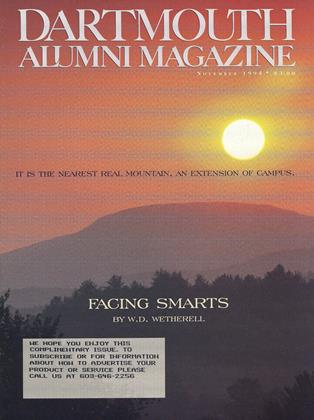After several years of telling kids to "just say no," early drug education may turn out to be a bust. According to Dartmouth Medical School researcher John Pryor, kids may already have overdosed on drug prevention programs by the time they need them most.
During Pryor's threeyear study of drug and alcohol prevention programs at four Upper Valley middle schools, adolescents told him that they tune out of drug education because they've heard it over and over already.
Rather than eliminating drug prevention programs from the lower grades, Pryor advises constructing a substance-abuse curriculum as comprehensive and coherent as a mathematics program, with age-appropriate lessons. First-graders, for example, can't understand the legal and physiological consequences of drug-taking, but they can learn how to ask for help when they are in trouble. Information about specific substances should be delayed until just before kids are likely to begin experimenting with them, probably around the fifth grade for tobacco and alcohol. A key issue for college students, says Pryor, an evaluator for Dartmouth's alcohol-education programs, is the interaction of alcohol with social relationships.
As an antidote to the overdose effect, he recommends avoiding repetition. "If you did algebra every year in math," he says, "you'd be sick of it, too."
 View Full Issue
View Full Issue
More From This Issue
-
 Feature
FeatureLooking for Mister Right Stuff
November 1995 By Jane Hodges '92 -
 Feature
FeatureNUMBER 3
November 1995 By Brooks Clark '78 -
 Cover Story
Cover StoryFACING SMARTS
November 1995 By W.D.Wetherell -
 Feature
FeaturePeter Smith's Tribal Links
November 1995 By Robert Sullivan '75 -
 Feature
FeatureSentimental Sap
November 1995 By Robert K. Nutt '49 -
 Article
ArticleDr. Wheelock's Journal
November 1995 By "E. Wheelock"
Article
-
 Article
ArticleFACULTY NOTES
December, 1915 -
 Article
ArticleGrease Paint and Wigs
NOVEMBER, 1926 -
 Article
ArticleWITH THE OUTING CLUB
June 1936 -
 Article
ArticleMileage Plus
Sept/Oct 2004 By Cynthia-Marie O'Brien '04 -
 Article
ArticleHOCKEY
DECEMBER 1970 By JACK DEGANGE -
 Article
ArticleBoxing: Not Just for Men Anymore
DECEMBER 1998 By Stephanie Edwards '00

